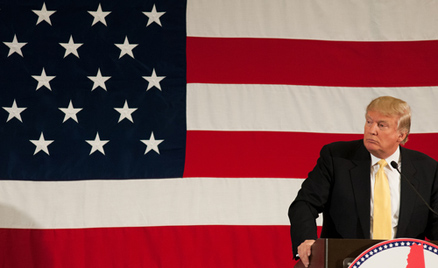Trump and immigration
 Andrew Cline / Shutterstock.com
Andrew Cline / Shutterstock.com
Anyone who believes our immigration system is not serving the national interest as well as it could must give at least two hurrahs to Donald Trump, the presumptive Republican nominee. He smashed the code of silence about an issue that is arguably having far more profound, questionable, poorly understood, and irreversible consequences for our society than any other national policy. Immigration advocates have been asked for the first time on a national stage to explain the rationale for the current system.
No other candidate from either party would have raised the fundamental questions Trump has. His proposals may be crude, mostly off the cuff, and always devoid of subtlety. Nonetheless, his willingness to wade into this volatile terrain forced into the open issues the gaggle of focus-grouped career politicians running for president would have gladly ignored.
Democrats were unlikely to rise to the occasion. They generally celebrate immigration and diversity and consider most complaints about the current system unjust and motivated by nativist prejudice. Their claim to the moral high ground loses some of its luster when one notes how the party benefits from immigration. Democrats currently win the lion’s share of immigrant-origin votes, and for influential party strategists, the continuation of immigration at historic levels is a critical element in the party’s long-term plan to become the permanent governing majority.
The presumptive Democratic nominee, Hillary Clinton, would be wise, if I may say so, to take the advice I offered in my essay, Americans First, for the First Year Project and avoid resuscitating the comprehensive bill that President George W. Bush could not get to his desk and that President Obama left on the Senate floor where he found it. A President Clinton may well decide to let sleeping dogs lie rather than enter into negotiations with an uncertain outcome.
In a normal presidential election year, the Republicans would be hopelessly divided on immigration. In this abnormal year, they are more divided than ever. The crux of their dilemma is that they have long been complicit in the construction of immigration policies that now, in a grim but richly deserved twist of fate, have their party well down the path to breakup or extinction.
Trump’s outbursts have thrown the Republican establishment’s electoral calculations into a cocked hat. Trump is unlikely to suffer the abject humiliation of going to the Latino power brokers to apologize for calling Mexican immigrants criminals and to promise to keep the immigration machine running full tilt. He does not do humiliation and never apologizes. Instead, Trump has asked if these policies are in the interest of the majority of Americans.
He has attacked cheap labor, legal or illegal, for business and has promised to deport millions of immigrants living here without authorization. Trump has also pledged to build a border wall and arrange for Mexico to foot the bill and called at various times for either a permanent or temporary halt to the admission of some or all Muslims into the United States. He has also rejected the idea that billions of the world’s poor have a “right” to emigrate to the United States and we have a moral obligation to admit them.
Leading figures from both parties have assailed his proposals. The mainstream media and the luminaries of academia have heaped scorn on the man and his message. Much of their commentary is unfair and illogical. Pointing out that there are political and logistical obstacles to the deportation of all 11.5 million unauthorized migrants does not mean that it is impossible to declare deportation our policy and to then deport some considerable number. That some of his proposals may run afoul of the Constitution is already leading to their hasty modification or disavowal. What the critics cannot ignore is the popularity of his ideas and the role they have played in his improbable rise.
It is easy to point out the many aspects of Trump’s personality and behavior that cause sensible people to keep their distance. One can easily imagine finding a more presentable person to lead a national effort to take control of the immigration system. But where has that person been for the last many decades? Given the unrelenting and vicious abuse that anyone can anticipate for offering the most prosaic criticism of the system, even if presented in elegant and polished language, the task may have required someone who was undeniably independent, had a taste for verbal combat, led an opulent private life most presidents would envy, and who did not need to win and keep public office. It required someone like Donald Trump.
Gary Freeman is Professor of Government at the University of Texas at Austin where he has taught since 1976. His publications deal with immigration policy and politics in the Western democracies. He has held Fellowships from the German Marshall Fund and the National Endowment for the Humanities. Two Collaborative Scholar awards supported research in Australia.